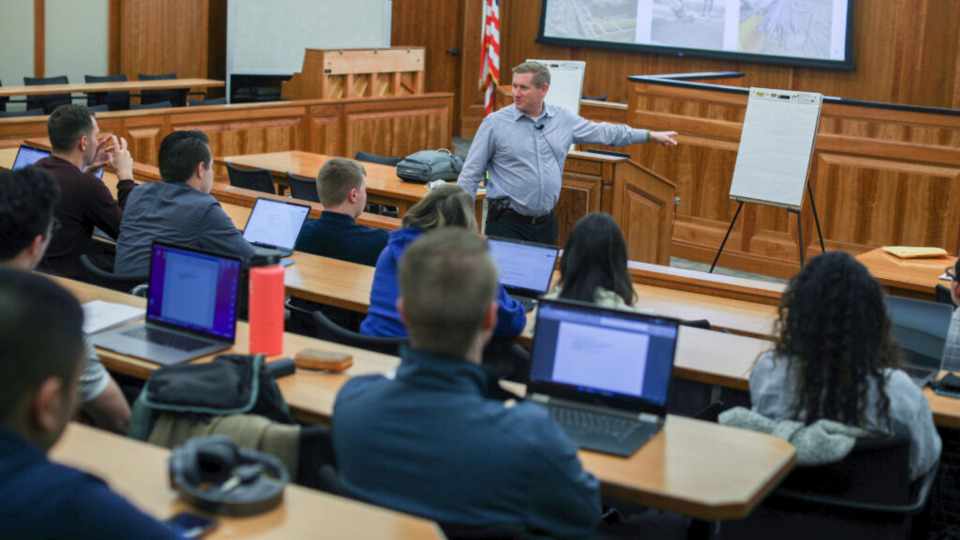
BYU Law School
Brigham Young University law professor Paul Stancil instructs a class of students. Photo courtesy of BYU Law School, courtesy of Church News.All rights reserved.This story appears here courtesy of TheChurchNews.com. It is not for use by other media.
By Jason Swensen, Church News
Want to send a cold chill through a recent law school grad?
Slowly utter these three words: The. Bar. Exam.
For generations of would-be attorneys, passing a state bar exam marks that professional rite of passage that stands between a juris doctor degree and a license to actually practice law.
For many, prepping for the bar exam can be exhausting and angst-ridden. And the country’s top law schools are in high demand, in part, because of their proven record of preparing their graduates to pass “the bar” on their first attempt.
Now Brigham Young University’s J. Reuben Clark Law School is being counted among the elite in readying its graduates for bar exam success.
The Church-sponsored institution cracked the top-10 list of U.S. law schools with the highest first-time bar exam passage rate in 2021, according to a Reuters story. Fellow top-10 institutions are the heavyweights of storied American law schools — including Harvard, New York University, Yale, Duke and Stanford.
In 2021, over 96% of BYU law school graduates passed the bar on their first attempt. That figure was realized even as first-time pass rates in law schools across the country fell more than three percentage points last year.
BYU Law School Dean D. Gordon Smith’s initial reaction upon learning his school had made the top-10 list was simple joy for the individual graduates that those percentages represent.
“When our students pass the bar exams they are super happy and their employment [opportunities] are better. … And they can move forward with their careers,” he said.
BYU law professor Catherine Bramble, whose duties include helping students prepare for the bar exam, credits the school’s success on its holistic approach in educating and involving students. BYU law professors are charged with helping their students “learn to learn.”
That begins at the moment of a BYU student’s admission and during pre-law school summer workshops — and then continues during his or her first year of law school, when the bar exam is still a distant notion. Such consistent attention to active learning reaches beyond simply teaching effective test-taking skills.
Cracking the top-10 list “really was the culmination of three years of effort,” said Bramble. “It’s been wonderful to see the support of the faculty and the administration, as well as the students.”
No two law students at BYU are identical, noted Smith. They all come from different backgrounds. They all manage different challenges. “So we treat every student as an individual — and try to bring to that individual what he or she needs to advance.”
“We Believe in You”
BYU Law students are told from the start of their 1L studies that they were admitted because BYU believes in them.
“We don’t admit students just to fill seats in the law school,” said Smith. “We admit them because we think they will be successful. We think they will be leaders in their profession, in their church and in their communities. … We think that every one of our students has a chance to be great.”
It’s said that a law degree is primarily a leadership degree. So it is vital that faculty and administrators at BYU regard their students as more than mere “degree seekers,” said Bramble.
“[We take] seriously our responsibility to help students become ‘whole attorneys’ who are happy and well and successful. We want them to be leaders. It is not just about getting through the curriculum and getting over a bar exam. We want our students to go out and be wonderful, contributing members of society — who are also healthy and balanced in their own lives.”
Seeing BYU’s law school ranked alongside the likes of Harvard, Yale and NYU is both eye-grabbing and validating — but Smith and Bramble don’t seem surprised.
“We’re trying to make everybody who’s a constituency of the law school proud,” said Smith. “We want our alumni to be proud. We want the Church to be proud of the law school. And we want the members of the Church to be proud. We want to be one of the programs that elevates BYU.”
While the top-10 ranking is commendable, BYU’s law school is not simply a three-year bar exam prep course. The focus and hopes of its professors and administrators stretch beyond annual rankings, future salaries of graduates and professional achievements.
“We want to create leaders who can go out and do good wherever they may be — whether that is in Utah or Singapore, or in a small office or at a large law firm,” said Bramble. “We want them to be representatives of the BYU Law School and of the Church and of Christ in the ways that they interact with others.”
Smith points to a sentence found in the BYU Law School Mission Statement: “We seek to be and develop people of integrity who combine faith and intellect in lifelong service to God and neighbor.”
Copyright 2022 Deseret News Publishing Company.